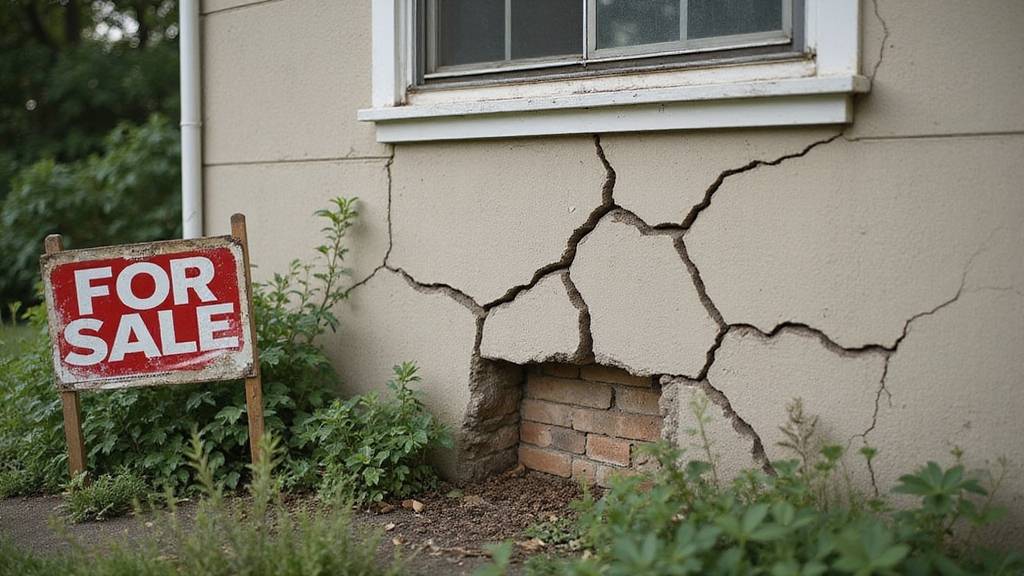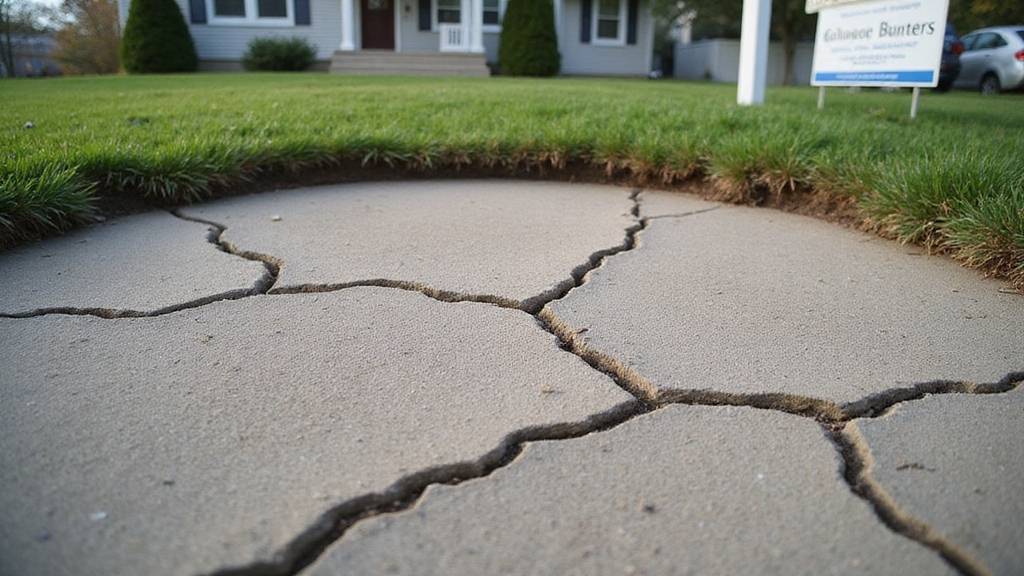Selling a house with foundation issues is a legal challenge. Many homeowners worry about how these problems affect the sale. You must understand the legal risks before listing your home.
Foundation problems can scare off buyers and lead to lawsuits. If you hide the damage or fail to disclose it, you can be held liable. The process can feel overwhelming without the right guidance.
You must disclose all known foundation issues and follow local laws to avoid legal trouble when selling your house. Proper documentation and transparency protect you and reassure buyers. This blog will guide you through the steps to sell your house legally and safely, even with foundation concerns.
Key Takeaways
- Sellers are legally required to disclose all known foundation issues in writing to potential buyers.
- Failure to disclose foundation problems can result in lawsuits, financial penalties, or contract rescission.
- State and local laws may have specific disclosure forms and requirements regarding structural defects.
- Maintaining detailed records of inspections, repairs, and engineer evaluations protects sellers from future liability.
- Consulting a real estate attorney or agent ensures compliance with all legal and contractual disclosure obligations.
Understanding Foundation Issues and Their Impact on Home Sales

Foundation issues can lower your home’s value and make selling harder. Buyers often worry about structural problems and may offer less money. If you want a smooth sale, you should address these problems early. Conducting a professional foundation inspection can help identify the severity of issues and guide your repair decisions. A professional foundation inspection shows the true condition of your home.
The inspector can tell you if repairs are minor or major. If repairs are needed, fixing them before listing may help attract buyers. Addressing foundation issues builds trust with potential buyers. Ignoring them could delay your sale or cause deals to fall through. Being aware of local building codes and regulations related to foundation repairs can also prevent legal complications. By understanding these impacts, you can make better choices and avoid problems during the sale.
State and Local Disclosure Requirements
Every state and many local governments have rules about what sellers must tell buyers. You must tell buyers about any known problems with your home’s foundation. This is usually done with a written disclosure form. A disclosure form ensures that all relevant information is officially documented and shared with potential buyers.
The form may also require you to list repairs or inspections related to the foundation. Sellers must also mention any zoning rules that affect the property’s use. If you do not share this information, you could face legal or financial trouble.Sellers are required to disclose any known foundation problems to buyers, typically using a written disclosure form.
Foundation issues can also change your home’s property tax value. Major damage may lower your home’s assessed value and affect your taxes. Always check your state and local laws for exact requirements. Disclosure laws often specify the timing and manner of providing this information to avoid penalties.
The Importance of Full Disclosure to Buyers

Full disclosure is important because it keeps buyers informed about the property’s true condition. Sellers must share all known problems or risks. If you hide information, you risk legal trouble and loss of trust.
You are required to tell buyers about foundation issues, environmental hazards, and zoning rules. These details help buyers make informed choices. Honest communication also helps prevent future disputes. Being aware of capital gains tax implications can influence how you approach disclosures and sales timing.
If you do not disclose problems, buyers may sue or cancel the deal. Legal and financial consequences can follow. Always provide clear and complete information. Proper documentation of known issues further protects sellers from legal liabilities.
Potential Liability for Failing to Disclose
You must understand that disclosure laws vary by state, so it’s essential to know exactly what your local regulations require. If you fail to reveal known foundation issues, you risk lawsuits, financial penalties, and even rescission of the sale. To protect yourself, always document disclosures and consult a knowledgeable real estate attorney for guidance.
Additionally, understanding the legal contract requirements is crucial to ensure compliance and avoid future legal complications. Being aware of state-specific disclosure laws can help you navigate the process more confidently and avoid potential pitfalls.
Disclosure Laws by State
State laws decide what you must tell buyers about foundation problems when selling a home. Most states require you to share any known issues. You should check your state’s specific rules before selling.
Some states need you to fill out written disclosure forms. Others may allow you to tell buyers about defects verbally. The way you disclose depends on your local laws.
Foundation problems caused by things like poor soil or drainage must be mentioned if you know about them. Not sharing this information could cause legal trouble later. Review your state’s disclosure laws and talk to a real estate attorney if you are unsure.
Consequences of Non-Disclosure
If you do not disclose known foundation problems when selling your house, you may face legal and financial trouble. The buyer could sue you for fraud or misrepresentation. Courts often support buyers if they show you hid important information.
Non-disclosure might also cause property tax disagreements. Buyers may claim the home’s value was too high because of hidden issues. You could be forced to pay for repairs or even cancel the sale.
Concealing problems can lower neighborhood property values. Trust among neighbors might decrease if many homes hide defects. If you want to avoid these risks, always share foundation issues, keep repair records, and talk to a real estate lawyer.
How Home Inspections Affect the Sale

Home inspections can affect how easily and quickly your home sells. If inspectors find foundation issues, it can lower the home’s value. Buyers may become cautious or ask for changes before buying.
An inspector checks the house for any signs of structural problems. If they find foundation issues, buyers often use this in price negotiations. They may ask for repairs, discounts, or credits. Home inspection process plays a crucial role in identifying these issues early on.
Sellers can be proactive by getting their own inspection or hiring a structural engineer. Doing this gives you documents to show buyers and builds trust. If you are open about problems, you can guide the negotiation process.
Understanding how inspections influence sales helps you prepare for buyer questions. If you have clear information and solutions, you can address concerns quickly. This makes the selling process smoother and more predictable. Fair cash offers from a local, trusted buyer can help you avoid costly repairs and streamline the sale process.
Working With Real Estate Agents
When selling a house with foundation issues, you need an agent who understands both the local market and the complexities of property disclosures. Prioritize candidates with experience handling similar transactions and a clear track record of ethical practices.
Your agent should guide you on exactly what information you must disclose to protect yourself legally and maintain buyer trust. Additionally, understanding disclosure requirements related to property condition can help prevent future legal disputes. Being aware of the local real estate market can also assist in setting realistic expectations and negotiating effectively.
Agent Selection Criteria
Choosing the right real estate agent is important when selling a house with foundation issues. Not all agents have experience with these types of homes. You need someone who knows how to handle the extra challenges.
The agent should be familiar with selling homes that have structural problems. If possible, ask for references from sellers with similar properties. You should also check if the agent communicates clearly and is easy to reach.
A good agent will suggest solutions like a home warranty for buyers. They should also know how to handle issues related to past repairs or the home’s title. If the agent can coordinate with inspectors and contractors, your sale will be smoother.
Always ask about the agent’s marketing plan for your property. The plan should be specific to homes with structural issues. If you find an agent who meets these criteria, you will have a better selling experience.
Disclosure Responsibilities Overview
If your home has foundation issues, you must legally tell buyers about the problem. Disclosure rules protect both you and the buyer. State and local laws often require written details about any foundation problems.
You should provide inspection reports and repair records if you have them. A real estate agent can help you complete all required paperwork. Proper disclosure helps avoid legal trouble later.
If you hide information, buyers might cancel the deal or ask for a lower price. Honest communication also helps you agree on a fair price. Full disclosure builds trust and makes the sale process smoother.
Options for Repairing Foundation Problems Before Selling
Fixing foundation problems before selling helps you avoid price drops and buyer hesitation. A strong foundation attracts more buyers and protects your home’s value. It also reduces delays during the sales process.
Start by hiring a structural engineer for a complete inspection. The engineer will explain the problem and suggest the best repair options. If you skip this step, you might miss hidden issues.
Common repairs include piering, underpinning, or slabjacking, depending on your soil and damage. Collect quotes from reliable contractors before starting any work. Always keep all inspection and repair documents for buyers.
If you invest in repairs, buyers will trust your home more. Showing proof of repairs can avoid legal trouble later. Fixing issues early makes for a smoother, faster sale. Effortless Selling Process can significantly improve your experience by handling paperwork and closing details efficiently.
Selling “As-Is”: What It Really Means
Selling a house “as-is” means you will not fix any foundation problems before selling. Buyers must accept the property’s current condition. You still have to tell buyers about all known issues.
Sellers must provide full legal disclosures about the property. If you hide defects, you could face legal trouble later. You are not required to repair foundation issues, but you must share this information. Additionally, understanding the co-ownership structure is essential if multiple owners are involved, as all owners’ rights and agreements can impact the sale process.
A home warranty may reassure buyers, but it rarely covers existing foundation issues. You should clearly state “as-is” terms in the sales contract. If you want to attract serious buyers, consider offering a limited home warranty, even with coverage limits.
Legal Implications of Selling to Investors or Cash Buyers
If you sell to investors or cash buyers, you must still follow the law. You are required to tell buyers about any foundation problems. This rule applies even if the buyer accepts the home “as-is.” Additionally, failing to disclose issues like foundation problems can lead to legal consequences, including lawsuits or fines, even after the sale.
Investors may do their own checks, but being honest protects you. Always check local disclosure laws before selling. Consulting a real estate lawyer can help you avoid mistakes. If you are unsure about the rules, get legal advice before you sell. For example, understanding your rights and obligations under disclosure laws ensures a smoother transaction and helps prevent future legal issues.
Negotiating Price Adjustments and Repairs
Foundation issues can affect how you negotiate price or repairs. You can still reach a fair deal by addressing these problems directly. If you discuss options early, you may avoid confusion later.
A structural engineer can inspect the foundation and write a report. This report explains the problem and lists possible solutions. If you share this report with the buyer, it builds trust.
You should get several repair quotes from trusted contractors. Accurate bids will help you and the buyer agree on fair costs. If repair costs are clear, negotiations are smoother.
You can offer to lower the price or fix the foundation before selling. If you have enough resources, handling repairs yourself may help. If not, a price reduction may be a better choice.
You should stay flexible and listen to the buyer’s needs. If both sides communicate openly, you are more likely to reach a fair agreement.
Impact on Mortgage Approval and Financing
When you sell a house with foundation issues, lenders will closely evaluate the property’s condition and risk level before approving a mortgage. You’ll need to understand how these concerns affect buyers’ financing options, such as FHA, VA, or conventional loans. By addressing lender requirements early, you can help streamline the sale and reduce financing complications.
Lender Risk Assessment Factors
Lenders review foundation problems carefully because these lower a property’s value and can cause safety issues. If the damage is serious, lenders might reject a mortgage application. They use the appraisal report to check for these risks.
Lenders consider how bad the foundation issue is and how much it will cost to fix. If repairs are not done, they may not approve the loan. They also look at how the damage affects the home’s resale value and livability.
If the appraiser finds major damage, lenders may ask for repairs before they approve the loan. In some cases, they might deny financing altogether. If repairs are completed, lenders may reconsider the application.
Financing Options for Buyers
If you want to buy a home with foundation issues, expect a complicated mortgage process. Most regular lenders see foundation problems as risky. You may need to look for renovation loans or hard money lenders.
FHA and VA loans often require foundation repairs before you can close. If you choose these loans, plan for extra time and costs. Lenders may also ask for a termite inspection to check for more damage.
Title insurance could have exceptions for foundation problems. Always review what your policy covers before you buy. You should gather engineer’s reports and repair estimates to help your application.
An experienced real estate agent can guide you to the right lenders. If you prepare well, you can avoid making costly mistakes. Careful planning helps protect your finances and legal interests.
Insurance Considerations for Sellers and Buyers
Foundation issues can change how insurance works for both sellers and buyers. Sellers must share all known foundation problems to avoid future insurance disputes. Buyers should know that many insurance policies do not cover existing structural issues.
Insurance companies may deny claims for repairs related to foundation problems found before purchase. Many policies have limits or exclusions for these types of repairs. If you want coverage for future repairs, you should check the policy details.
Always review the home’s insurance history before buying or selling. You should talk to your insurer about how foundation issues could change your coverage or premiums. If the inspection finds problems, both parties may need to adjust their plans.
Handling Offers and Counteroffers With Known Structural Damage
When you handle offers and counteroffers with known structural damage, you need a clear plan. Buyers often consider repair costs, environmental concerns, and legal risks. You should address these issues directly and honestly.
Disclose all known damage at the start of negotiations. If possible, provide repair estimates to show you are prepared. This can help reduce your liability as a seller.
Buyers may ask for lower prices or special terms if damage is present. They might also want environmental fixes or warranties included. If these requests arise, respond with flexibility and clear information.
The table below shows common buyer concerns and ways you can respond. Proper responses help ensure you meet legal requirements. This approach leads to a smoother sale and fewer legal problems.
Protecting Yourself With Proper Documentation
You need to document every step when selling a house with foundation issues to avoid future disputes. Disclose all known problems, keep detailed records of repairs and inspections, and use clear as-is sale clauses in your contract. These steps protect you legally and set clear expectations for buyers.
Disclosing Known Foundation Problems
When selling a house with foundation problems, you must tell buyers about them. Laws require you to share all known issues, even small ones. This protects you from legal trouble later.
Sellers should list all visible cracks and uneven spots in the foundation. Any previous repairs or reinforcements must be reported. If you have a report from a structural engineer, you should share it.
Written disclosure is best for your protection. Buyers will value your honesty and clear information. Honest disclosure can prevent problems after the sale.
Gathering Repair and Inspection Records
Gathering repair and inspection records is important when selling a house with foundation issues. These records prove what work was done and show you took care of problems. Buyers and agents will want to see this documentation.
If you have inspection reports or engineering evaluations, collect them all. Keep receipts for any repairs and include details of foundation work. Make sure you have contractor warranties and a summary of the work completed.
Documentation helps answer questions and makes the sale process smoother. If you keep clear records, it is harder for buyers to claim you hid problems. This paperwork gives you legal protection if issues come up after the sale.
Including As-Is Sale Clauses
An as-is sale clause helps protect sellers when a house has foundation problems. This clause states that the buyer accepts the property’s current condition. If foundation issues arise later, sellers have legal protection.
Sellers should list all known foundation and structural issues in the contract. Attaching inspection and repair reports can support these disclosures. Buyers must confirm in writing that they understand and accept the as-is condition.
If you use a detailed as-is clause, you lower your risk of legal problems after the sale. Accurate disclosures show honesty and protect everyone involved. Always seek legal advice if unsure about contract terms.
Conclusion
If you want to sell a house with foundation issues, you must understand the legal risks. If you fail to disclose problems, you could face legal trouble later. Honest communication and proper documentation can help you avoid many disputes.
If you disclose everything and follow legal advice, you increase your chances of a smooth sale. You also build trust with potential buyers. If you wish to avoid lengthy repairs or negotiations, you can consider selling your house for cash.
If you want a simple, fast sale, we at Freedom Path Investors can help. We buy houses for cash and handle all the paperwork. Contact us today to learn how we can make your sale stress-free.







